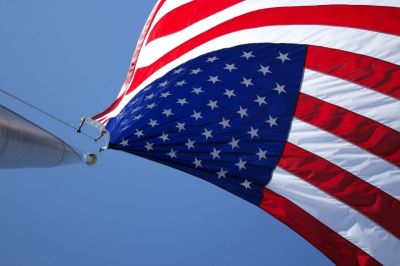Is America Worth Saving?

As President, Barack Obama had what Politico called "an apology complex," viewing America, it seems, as a nation with a criminal history and himself as the instrument of retribution. During his two terms in office, America-bashing — which had gone out of style with the end of the Vietnam War and hinted of treason after 9/11 (ask the Dixie Chicks) — was suddenly fashionable again. Of course, it never really ceased to exist, it just went underground.
But no longer.
America-bashing is now all the rage. Making its first bold modern-day appearance under President Obama, it has become a cause célèbre with the election of President Trump. Indeed, a hatred for Donald Trump and the "deplorables" he represents is what fuels it. Trump's White House has become the flashpoint in a winner-take-all contest featuring two very different visions for America.
One group sees America's wealth, power, and influence as an accident of history. For them, the idea of "American Exceptionalism" is not only dead, it is offensive. These people never tire of lecturing us about how out-of-step America is with the rest of the world and how she needs to get with it. America, they say, is bad for the world. Moreover, where America is exceptional — a deep suspicion of socialism and environmentalism; strongly Christian in a post-Christian world; and alone patriotic among Western nations swept up in a globalist dream — is where America is at her worst and must change.
Others want to preserve America's uniqueness, her exceptionalism, which is anchored in a Judeo-Christian heritage that has given rise to her laws, art, literature, culture and place in the world as a refuge from just the types of governments the Left idealizes. Proponents of this vision would readily acknowledge that America's global influence has, at times, been evil, but this is, they would argue, the result of an agenda that has nothing whatsoever to do with the principles upon which America was founded. On the contrary, that agenda — championed by the Left and epitomized by America's bullying of Third World countries to adopt permissive abortion and LGBT policies — is at odds with those principles. Trump's rallying cry — "Make America Great Again" — embodies this group's fear that America is rapidly becoming something not-so-great and that it must be saved.
The war between these competing visions is played-out every day in local and national government, in our courts of law, in schools and universities, in media, and even in families. Listening to this cultural debate — it is not only inescapable, it is tearing our country apart — it occurred to me that the vision advocated by those who would burn America to the ground Ferguson-style presupposes there are better places in the world to live. Are there? Were Alec Baldwin to leave the country as he once promised, where would he go?
To put it another way, if America isn't great, who is?
This question began to consume my waking hours.
"Do you think the United States is a great country?" I asked a lawyer friend of mine.
"It was once," he said, sounding a bit like the question depressed him. "Maybe it still is, I don't know."
I asked a similar question of an acquaintance at the New York Times. He had clearly thought about this before:
"I think France or Sweden have soft socialist models that provide better healthcare and social services for those people who aren't rich."
"Have you ever been to either of those countries?" I asked.
"No, but I am told that it works."
"I'm dubious," I said. "I've been to both and I can tell you that sipping champagne along the Champs Elysees is very different from living as the average citizen of those countries lives."
These questions and their very different answers got me wondering: what if you could put these questions, these visions, to the test? What if you could do what French political theorist Alexis de Tocqueville did in 1831 — but in reverse. That is, rather than traveling across America to search out the source of her strength as de Tocqueville did, go, instead, around the world to see how America really stacks-up against those countries that serve as a model for the new America the Left aspires to create.
So intrigued am I by this idea, that I have decided to do precisely that. In a few weeks' time, I will, in the manner of Jules Verne's classic novel, go around the world in 80 days, hitting six continents and 23 countries. Along the way, I will explore the question of national greatness. Is it simply a matter of economics or is religion a factor? Does socialism really work or is it a government-sponsored Ponzi scheme? Is America past her prime and should the Statue of Liberty be relocated to Sweden or Switzerland or Japan as the world's new "last best hope"?
If, at the end of those 80 days, I discover that America, when measured against the rest of the world, isn't so great after all, I will submit to the Left's vision and toss a log on the Great American Bonfire. If, however, I discover that their vision is naïve and dangerous — as I suspect it is — I will urge Americans to fight for the principles that once served to make this country great.
It should be interesting. In the end, this is the question to be answered:
Is America worth saving? Follow the expedition and find out.




























